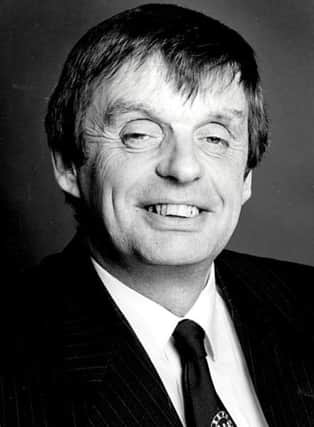Obituary: Arthur Wood OBE, leader in Scottish child welfare


Arthur Wood, former General Secretary of the Royal Scottish Society for the Prevention of Cruelty to Children (RSSPC) now known as Children 1st) was born in Kilbarchan on 15 December, 1937 and died on 30 April, 2017.
The son of a Church of Scotland minister, Arthur grew up in an Edinburgh manse with his sister, Ann. He attended George Watson’s College where his interest in sports was nurtured. His enthusiasm for rugby was matched by his lifelong passion for tennis. In younger days he played squash regularly and was skilled at table tennis. He loved books and reading and voiced an ambition to open a bookshop in retirement. These early years also introduced him to the guitar. It was the age of skiffle and, as with everything else, Arthur launched into it with gusto.
Advertisement
Hide AdAdvertisement
Hide AdHe undertook a law degree at Edinburgh and, after a legal apprenticeship, qualified as a solicitor and began a career with Standard Life. However, when Claude Forsyth, then General Secretary of the RSSPCC recruited him as Assistant Secretary in 1962, he jumped at the opportunity. It was an inspired appointment.
The 1960s was a time of enormous change in child welfare provision in Scotland and the charity made a distinctive contribution to the work of the McBoyle Committee and responded to the proposals of the Kilbrandon Committee. Aware of the huge implications for this well-known charity, Arthur’s primary role in these early days was to find appropriate responses to the changes within the organisation of social welfare. He attended a Home Office in-service course and benefitted from a Churchill Scholarship to the USA, preparing him for the next stage in his career. He succeeded Claude Forsyth as General Secretary of the Society in 1968, the year of the passing of the Social Work Scotland Act. This piece of far-sighted legislation paved the way for an expansion of social work departments across the country and for the introduction of Children’s Hearings in 1971.
Alongside the professional training of staff, Arthur focused on research. In 1969, in partnership with the NSPCC, he was instrumental in bringing Professor Henry Kempe of Denver to Moray House College in Edinburgh. It was Kempe who coined the phrase “Battered Baby”. This was a time of new understanding and awareness of child abuse. In 1978, under Arthur’s leadership, the charity entered into a collaboration with Strathclyde Region, Greater Glasgow Health Board and central government to set up the first Special Unit in Scotland for non-accidental injury to children at the Overnewton Centre in Glasgow.
Arthur had a great capacity to listen and learn from others. He saw himself as the bridge between the paid staff and the volunteers who supported, funded and governed the charity. With a shift in emphasis from the traditional role of Inspectors (“Cruelty Men”) and domiciliary support through Women Visitors, he encouraged new initiatives to provide direct support to vulnerable families. While extreme cases of physical abuse were of great public concern, Arthur was always anxious to indicate that such cases constituted only ten per cent of the charity’s overall work. Increasingly the Society’s role was protective and supportive to families who brought themselves to the Society because they wanted help and support.
As a solicitor Arthur had a particular interest in legal aspects of child protection and was a member of the former Scottish Child Law Group. With the demise of that group he set about forming a legal committee within the RSSPCC to maintain the impetus in areas of child protection and children’s rights. Under his leadership the charity campaigned on a number of issues, including support for child witnesses and the ending of corporal punishment in schools. Keen to make advice and support readily accessible to families and children, the Parentline helpline was opened with the support of central government. Reinforcing the charity’s single-minded commitment to children, Arthur supported the change to the working title of Children 1st in the mid-1990s.
The late 20th century was a period of major challenges for those working in the field of child protection with several high-profile cases. Meanwhile, there was the perennial issue of raising funds to provide the essential services for children and families. Arthur built a core team to build public awareness and explore new avenues of funding. He made a distinctive contribution to this through his own public speaking engagements and links with radio and television.
In 1963, Arthur married Audrey Collier and they had four children. Arthur and Audrey divorced in 1984 and in 2002 I conducted the marriage of Arthur and Mary Mackay, who had been his Head of Fund Raising. They had many happy times together, as well as travelling the world through house swaps, while Arthur also continued to visit his beloved Islay. Arthur and Mary were close to both sets of children and grandchildren. His diagnosis of dementia in 2006 led to a prolonged period of illness, but also with stretches of lucidity and rude health, surrounded by his much-loved books.
Arthur was the right man for the times. He was a visionary, an inspired motivator and a great encourager. His appreciation of, and commitment to colleagues and volunteers was reciprocated and contributed to what many referred to as the ‘RSSPCC family’. It was typical that when he received public recognition with the awarding of an OBE, he repeatedly told colleagues “this is for us”.
Advertisement
Hide AdAdvertisement
Hide AdIn retirement, among other interests, he chaired Epilepsy Scotland, was a trustee of the Pastoral Care Foundation, and local organiser for Christian Aid.
What Arthur Wood contributed to the wellbeing of vulnerable children and families across Scotland for almost forty years, was mirrored in his devotion to his own family. Arthur is survived by his first wife Audrey, wife, Mary, their seven children and 14 grandchildren.
CONTRIBUTED